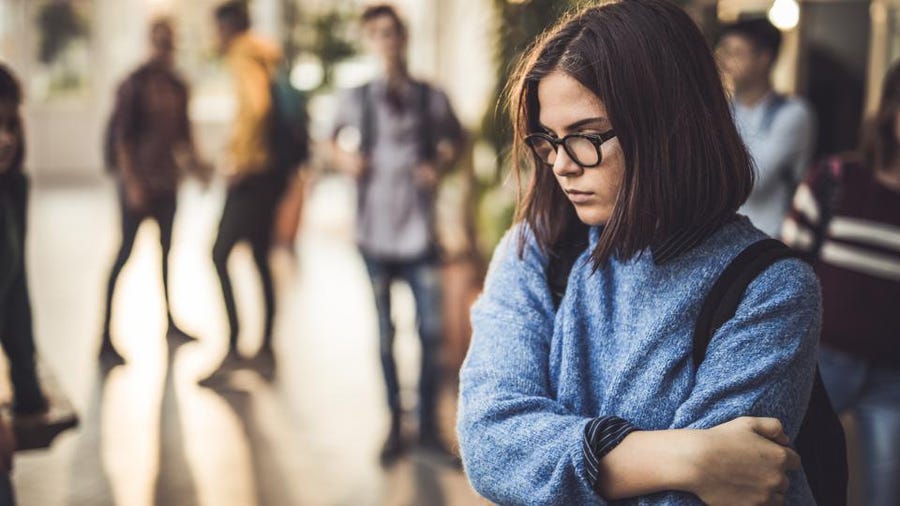Do you feel shy and uncomfortable in social situations? Do you find yourself worrying about what other people think of you? If so, you may be experiencing a social anxiety disorder. This is a condition that affects millions of people each year and can cause a great deal of distress. In this blog post, we will discuss what social anxiety disorder is, its causes, and the treatment options available.
Contents
What Is Social Anxiety Disorder?
 Social anxiety disorder is described as an intense fear of social situations that may include meeting new people, being watched or judged by others, or feeling embarrassed. This fear can lead to avoiding social situations altogether. For some people, it might feel like they can’t catch a break from the anxiety, and it might start to interfere with work, school, or other aspects of life.
Social anxiety disorder is described as an intense fear of social situations that may include meeting new people, being watched or judged by others, or feeling embarrassed. This fear can lead to avoiding social situations altogether. For some people, it might feel like they can’t catch a break from the anxiety, and it might start to interfere with work, school, or other aspects of life.
It is important to understand that it is far different and extreme from social phobia or shyness. If we talk about social phobia it is the fear of a specific situation such as public speaking. Shyness, on the other hand, is much milder and does not always include the same intense fear or avoidance.
According to studies, social anxiety disorder gets diagnosed in around 15 million American adults every year. It is also seen that this disorder has a higher chance of developing in women as compared to men. However, it is still not clear what exactly causes this disorder.
For accurate treatment and healthy recovery, you need to discuss things with a professional. Only they can guide you in the right direction. So, do not hesitate to take that first step.
What Are The Symptoms?
The symptoms of social anxiety disorder can be split into three categories: physical, cognitive, and emotional.
Physical symptoms
Physical symptoms of this condition are those that manifest in the body. They can include things like:
- sweating
- heart palpitations
- dizziness or lightheadedness
- trembling or shaking
- muscle tension
- shortness of breath
- rapid heart rate
- blushing
Cognitive symptoms
Cognitive symptoms are those that affect your thinking and perception. With a social anxiety disorder, you may:
- worry about being judged or evaluated by others
- fear embarrassing yourself in front of others
- worry that others will notice your anxiety
- avoid activities or situations due to fear of embarrassment
- think negative thoughts about yourself
- have a hard time concentrating on anything other than your anxiety
Emotional symptoms
 The emotional symptoms of social anxiety disorder can be just as debilitating as the physical and cognitive symptoms. Emotional symptoms include:
The emotional symptoms of social anxiety disorder can be just as debilitating as the physical and cognitive symptoms. Emotional symptoms include:
- feeling tense or nervous
- having a hard time relaxing
- feeling like you’re “on edge” all the time
- feeling hopeless or helpless
- losing interest in things you once enjoyed
- feeling low self-esteem or inadequacy
- having difficulty controlling your fear
These three types of symptoms can be extremely debilitating and make it hard to go about your day-to-day life. If you’re struggling with social anxiety disorder, it’s important to seek out professional help. There are many treatment options available that can help you manage your symptoms and live a more normal life.
Is Social Anxiety An Autism Form?
It is often said that people with social anxiety are “on the autism spectrum.” While this may be true for some, it is not necessarily true for all. There are many different types and degrees of social anxiety, and each person experiences it differently. Just because someone has social anxiety does not mean they are autistic.
However, there are some similarities between the two disorders. Both involve difficulty with social interaction and communication. People with social anxiety often avoid eye contact, have trouble talking to people, and feel very uncomfortable in social situations. They may also have obsessive interests and repetitive behaviors. People with autism spectrum disorder may also have these symptoms.
The main difference between the two disorders is that people with social anxiety disorder are anxious about social situations, while people with autism spectrum disorder do not necessarily experience anxiety. Autism spectrum disorder is a developmental disorder that affects the way the brain processes information. Social anxiety disorder is an anxiety disorder that causes feelings of fear, worry, and embarrassment in social situations.
So, while people may confuse social anxiety disorder as a form of autism, it is its disorder with its own set of symptoms. If you think you may have this condition, talk to a mental health professional to get a diagnosis and treatment plan.
What Causes Social Anxiety Disorder?
 The causes of this disorder can be broken down into three categories: genetics, environment, and brain chemistry. It’s believed that a combination of these factors contributes to the development of social anxiety disorder.
The causes of this disorder can be broken down into three categories: genetics, environment, and brain chemistry. It’s believed that a combination of these factors contributes to the development of social anxiety disorder.
For example, someone who has a parent or close relative with a social anxiety disorder may be more likely to develop the condition. Because they are more likely to have the genes that predispose them to the disorder. Around 30 to 40 percent of people with social anxiety disorder have a family member who also suffers from the condition.
In addition, negative experiences in childhood or adolescence, such as:
- bullying
- teasing
- abuse
- family conflict
It can increase the risk of developing a social anxiety disorder. As well as witnessing someone close to you going through something traumatic. These negative experiences are thought to play a role in changing the way the brain processes information.
Environmental factors may also play a role. If someone grows up in a household where there is criticism or teasing, they may be more likely to develop this condition. As well as if they witness others being treated this way.
Lastly, brain chemistry can contribute to the development of a social anxiety disorder. An imbalance of certain chemicals in the brain, such as serotonin, can lead to symptoms of this type of disorder.
This suggests that there may be risk factors that make someone more likely to develop a social anxiety disorder. However, it’s important to remember that not everyone who experiences these risk factors will go on to develop the condition. If you’re concerned about your symptoms or think you may have this disorder, speak to a mental health professional.
How To Diagnose It?
The diagnosis of social anxiety disorder is made by a mental health professional after a thorough clinical assessment. This assessment includes taking a detailed history and conducting a clinical interview. The mental health professional will also want to rule out other conditions that may be causing the symptoms (e.g., depression, substance abuse, etc.).
The diagnosis of social anxiety disorder can be tricky because the symptoms can be similar to other conditions (e.g., depression, generalized anxiety disorder, etc.). Therefore, it is important to seek professional help if you are experiencing any of the above symptoms.
Because this condition is not something that people typically talk about, it can be hard to seek help. More often, the diagnosis method can be an online screening tool or a self-test. These can be found on the internet or through mental health professionals.
Therefore, an accurate diagnosis is required for effective treatment. When you can identify the root of your problem, you can work on resolving it.
How To Treat Social Anxiety Disorder?
 If you are diagnosed with this condition then you should know that there are many ways to treat social anxiety disorder. The most common and effective treatments are:
If you are diagnosed with this condition then you should know that there are many ways to treat social anxiety disorder. The most common and effective treatments are:
Therapy
This is always the first step in treating any kind of anxiety disorder. A therapist can help you understand your condition and figure out the root of your problem. They will also teach you how to cope with your symptoms and manage them better.
- Cognitive-behavioral therapy (CBT) is the most effective type of therapy for social anxiety disorder. It teaches you how to change the negative thoughts and beliefs that are causing your anxiety. It is believed that the main goal of CBT is to help you learn how to control and manage your anxiety so that it no longer controls you.
- Exposure therapy is another type of CBT that can be very effective for social anxiety disorder. This type of therapy slowly exposes you to situations that make you anxious. As you get used to these situations, your anxiety will lessen.
So these two are the most effective therapy proven to be working. Some other therapy types include:
Medication
If therapy doesn’t work or if your symptoms are very severe, your doctor may prescribe medication. The most common type of medication used to treat social anxiety disorder is antidepressants. These can help reduce your symptoms and make it easier for you to function in everyday life. Other medications include:
- beta-blockers, which can help control your physical symptoms such as trembling or sweating
- anti-anxiety medications, which can help reduce your anxiety and make it easier for you to function in everyday life
But it is always suggested to first try therapy since medication can have many side effects. If you do start taking medication, it’s important to work with your doctor to find the right one for you and to monitor the dosage. Medication is not a cure for social anxiety disorder, but it can help manage the symptoms.
Support groups
It is often helpful to attend a support group for social anxiety disorder. This can provide you with an opportunity to meet and interact with other people who are dealing with the same condition. It can also be a great way to learn about different treatment options and share information about what has worked for you.
Also, it is important to remember that you are not alone in dealing with this condition. Many other people are struggling with the same condition. You can find support and understanding from family and friends, as well as from professional organizations.
Natural treatment
 For social anxiety disorder, some natural treatments may help. These include:
For social anxiety disorder, some natural treatments may help. These include:
- Exercise: It helps through the release of endorphins, which are natural mood enhancers.
- Deep breathing: This can help ease anxiety symptoms by promoting relaxation. You can try this by focusing on your breath and counting to four as you inhale, then counting to four as you exhale.
- Herbal supplements: Some herbs, such as chamomile and lavender, have been shown to help reduce anxiety. As it works differently for each person, it’s important to speak with a healthcare professional before taking anything.
- Acupuncture: This traditional Chinese medicine treatment involves inserting thin needles into specific points on the body. Some research has shown that it may help to ease anxiety symptoms.
- Aromatherapy: It is another alternative treatment that uses essential oils to promote relaxation. You can use a diffuser with lavender oil or add a few drops of it to your bathtub.
If you’re interested in trying any of these natural treatments, be sure to speak with your healthcare professional first to see if they’re right for you.
Self-help
Along with various treatment options, self-help is something that you should always consider when suffering from a social anxiety disorder. Below are some tips:
- Educate yourself about social anxiety disorder. This will help you understand your condition and give you a sense of control.
- Avoid alcohol and drugs. They may seem to help in the moment, but can actually make your symptoms worse in the long run.
- Challenge your negative thoughts. Once you identify them, you can start to question and reframe them.
- Expose yourself to social situations gradually. This will help you build up confidence and eventually be more comfortable in social situations.
- Practice healthy coping skills. This includes things like deep breathing, visualization, and progressive muscle relaxation.
- Spend time outdoors. Being in nature can help reduce stress and anxiety.
- Make sure to get enough sleep. Enough sleep is always important for overall mental and physical health, but it’s especially important if you’re dealing with anxiety.
- Eat a healthy diet. It is important to eat nutritious meals to help reduce stress and anxiety.
All in all, these are some tips to help you better cope with social anxiety disorder. If you think you may be suffering from the condition, please consult a mental health professional. Because everyone experiences anxiety differently, treatment will be different for everyone as well. But don’t suffer in silence, there are options out there for you.
Conclusion
In conclusion, it is to be noted that social anxiety disorder is a real problem that should not be taken lightly. It can hurt one’s quality of life, and sometimes, even lead to suicidal thoughts. However, there is help available. If you or someone you know suffers from this type of disorder, please reach out to a mental health professional.
There are also many great books and articles on the subject that can provide valuable insights and tips on how to cope. So do not give up hope, and keep fighting the good fight.
For more information and tips you can contact Therapy Mantra. We have a team of professional therapists who can provide you with the support and guidance you need to recover from this condition. Contact us today to learn more about our services. You can also book an online therapy session or download our free Android or iOS app.


